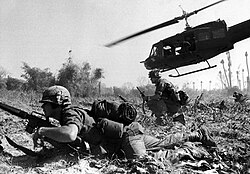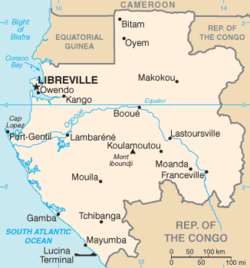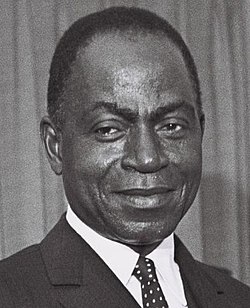Portal:1960s
The 1960s Portal
The 1960s became synonymous with the new, radical, and subversive events and trends of the period. In Africa the 1960s was a period of radical political change as 32 countries gained independence from their European colonial rulers. Some commentators have seen in this era a classical Jungian nightmare cycle, where a rigid culture, unable to contain the demands for greater individual freedom, broke free of the social constraints of the previous age through extreme deviation from the norm. Christopher Booker charts the rise, success, fall/nightmare and explosion in the London scene of the 1960s. However, this alone does not explain the mass nature of the phenomenon. Several nations such as the U.S., France, Germany and Britain turned to the left in the early and mid 1960s. In the United States, John F. Kennedy, a Keynesian and staunch anti-communist, pushed for social reforms. His assassination in 1963 was a stunning shock. Liberal reforms were finally passed under Lyndon B. Johnson including civil rights for African Americans and healthcare for the elderly and the poor. Despite his large-scale Great Society programs, Johnson was increasingly reviled by the New Left at home and abroad. The heavy-handed American role in the Vietnam War outraged student protestors across the globe, as they found peasant rebellion typified by Ho Chi Minh and Che Guevara more appealing. Italy formed its first left-of-center government in March 1962 with a coalition of Christian Democrats, Social Democrats, and moderate Republicans. Socialists joined the ruling block in December 1963. In Britain, the Labour Party gained power in 1964. In Brazil, João Goulart became president after Jânio Quadros resigned. This is a Featured article, which represents some of the best content on English Wikipedia..
Tropical Storm Brenda was the second named storm of the 1960 Atlantic hurricane season. It developed in the northeastern Gulf of Mexico on July 28, and after moving ashore over the Florida Peninsula, it attained tropical storm status. It accelerated northeast along the U.S. East Coast, ultimately peaking as a moderate storm with winds of 60 mph (97 km/h) before crossing the Mid-Atlantic states and New England; it dissipated on July 31 over southern Canada. It inflicted moderate damage in Florida, the worst since Hurricane Easy of 1950, and dropped heavy rainfall as far north as New York City. Its total damage was estimated at US$5 million, and only indirect deaths were blamed on it. (Full article...) This is a Good article, an article that meets a core set of high editorial standards.
The 1964 Gabonese coup d'état was staged between 17 and 19 February 1964 by Gabonese military officers who rose against Gabonese President Léon M'ba. Before the coup, Gabon was seen as one of the most politically stable countries in Africa. The coup resulted from M'ba's dissolution of the Gabonese legislature on 21 January 1964. During a takeover with few casualties, 150 coup plotters arrested M'ba and a number of his government officials. Through Radio Libreville, they asked the people of Gabon to remain calm and assured them that the country's pro-France foreign policy would remain unchanged. A provisional government was formed, and the coup's leaders installed Deputy Jean-Hilaire Aubame, who was M'ba's primary political opponent and had been uninvolved in the coup, as president. Meanwhile, M'ba was sent to Lambaréné, 250 kilometres (155 mi) from Libreville. There was no major uprising or reaction by the Gabonese people when they received word of the coup, which the military interpreted as a sign of approval. After being informed of the coup by Gabonese Chief of Staff Albert-Bernard Bongo, French President Charles de Gaulle resolved to restore the M'ba government, honoring a 1960 treaty signed between the deposed government and France when Gabon became independent. With the help of French paratroopers, the provisional government was toppled during the night of 19 February and M'ba was reinstated as president. Afterward, M'ba imprisoned more than 150 of his opponents, pledging "no pardon or pity" but rather "total punishment". Aubame was sentenced to 10 years of hard labor and 10 years of exile, a sentence that was later commuted. During this time, the ageing president became increasingly reclusive, opting to stay in his presidential palace under the protection of French troops. Within three years, M'ba was diagnosed with cancer; he died on 28 November 1967. (Full article...) Selected picture - Malcolm X was an American Black Muslim minister and a spokesman for the Nation of Islam. Born Malcolm Little, he changed his surname to "X" as a rejection of his "slave name". Tensions between him and the Nation of Islam caused him to break from the group in 1964. He claimed to have received daily death threats and his house was burned to the ground in February 1965. One week later, Malcolm X was assassinated, having been shot in the chest by a sawed-off shotgun and 16 times with handguns. Three members of the Nation of Islam were convicted.
Did you know -
Related portalsThis is a Featured article, which represents some of the best content on English Wikipedia..
George Harrison (25 February 1943 – 29 November 2001) was an English musician, singer and songwriter who achieved international fame as the lead guitarist of the Beatles. Sometimes called "the quiet Beatle", Harrison embraced Indian culture and helped broaden the scope of popular music through his incorporation of Indian instrumentation and Hindu-aligned spirituality in the Beatles' work. Although most of the band's songs were written by John Lennon and Paul McCartney, most Beatles albums from 1965 onwards contained at least two Harrison compositions, including "Taxman", "Within You Without You", "While My Guitar Gently Weeps", "Something" and "Here Comes the Sun". Harrison's earliest musical influences included George Formby and Django Reinhardt; subsequent influences were Carl Perkins, Chet Atkins and Chuck Berry. By 1965, he had begun to lead the Beatles into folk rock through his interest in Bob Dylan and the Byrds, and towards Indian classical music through his use of Indian instruments, such as the sitar, which he had become acquainted with on the set of the film Help!. He played sitar on numerous Beatles songs, starting with "Norwegian Wood (This Bird Has Flown)". Having initiated the band's embrace of Transcendental Meditation in 1967, he subsequently developed an association with the Hare Krishna movement. Harrison's first marriage to model Pattie Boyd in 1966 ended in divorce in 1977. In the following year he married Olivia Arias, with whom he had a son, Dhani. (Full article...) This is a Good article, an article that meets a core set of high editorial standards.
Félix Houphouët-Boigny (French: [feliks ufwɛ(t) bwaɲi]; 18 October 1905 – 7 December 1993), affectionately called Papa Houphouët or Le Vieux ("The Old One"), was an Ivorian politician and physician who served as the first president of Ivory Coast from 1960 until his death in 1993. A tribal chief, he worked as a medical aide, union leader, and planter before being elected to the French Parliament in 1945. He served in several ministerial positions within the Government of France before leading Ivory Coast following independence in 1960. Throughout his life, he played a significant role in politics and the decolonisation of Africa. Under Houphouët-Boigny's politically moderate leadership, Ivory Coast prospered economically. This success, uncommon in poverty-ridden West Africa, became known as the "Ivorian miracle"; it was due to a combination of sound planning, the maintenance of strong ties with the West (particularly France) and development of the country's significant coffee and cocoa industries. However, reliance on the agricultural sector caused difficulties in 1980, after a sharp drop in the prices of coffee and cocoa. (Full article...)
Selected article -The 1960 Winter Olympics (officially the VIII Olympic Winter Games and also known as Squaw Valley 1960) were a winter multi-sport event held from February 18 to 28, 1960, at the Squaw Valley Resort (now known as Palisades Tahoe) in Squaw Valley (now known as Olympic Valley), California, United States. The resort was chosen to host the Games at the 1956 meeting of the International Olympic Committee (IOC). Squaw Valley was an undeveloped resort in 1955, so the infrastructure and all of the venues were built between 1956 and 1960 at a cost of US$80,000,000 (equivalent to $850,303,712 in 2024). The layout was designed to be intimate, allowing spectators and competitors to reach most of the venues on foot. The 1960 Winter Games hosted athletes from 30 nations, competing in four sports and 27 events. Biathlon and women's speed skating made their Olympic debuts. Bobsled was not on the Winter Olympic program for the only time; the organizers had decided the events did not warrant the cost of building a bobsled venue after a poll indicated that only nine countries were planning to participate. (Full article...) More Did you know (auto generated)
TopicsCategoriesWikiProjects
Associated WikimediaThe following Wikimedia Foundation sister projects provide more on this subject:
Discover Wikipedia using portals |






























